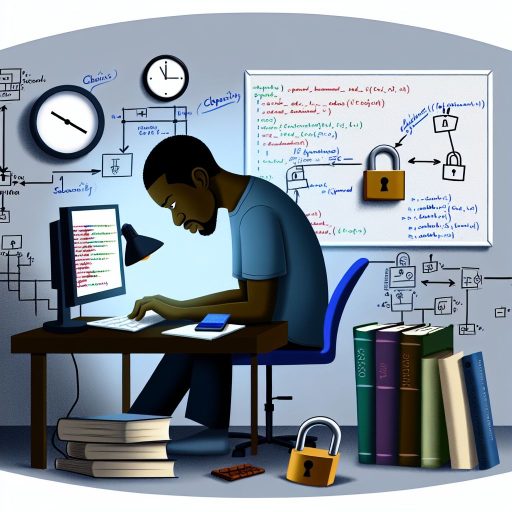Introduction to Ethical Hacking in Nigeria
Ethical hacking has gained prominent attention in Nigeria’s digital landscape.
This practice focuses on identifying vulnerabilities within systems and networks.
With the rise of cybercrime, ethical hackers play a crucial role in enhancing security.
They help organizations prevent security breaches and data leaks.
Moreover, ethical hacking fosters a culture of security awareness among employees.
Many companies now seek certified ethical hackers to bolster their defenses.
Some of these professionals work independently while others are part of larger firms.
Organizations benefit from their expertise in penetration testing and risk assessment.
Furthermore, these hackers enable compliance with international security standards.
The Landscape of Cybersecurity in Nigeria
Nigeria faces increasing threats from cybercriminals targeting various sectors.
Government agencies, financial institutions, and corporations are common targets.
Consequently, the demand for cybersecurity professionals continues to grow.
Ethical hackers help bridge the gap between existing security measures and emerging threats.
The Role of Ethical Hackers
Ethical hackers perform assessments to discover system vulnerabilities.
They employ techniques similar to those used by malicious hackers.
By simulating attacks, they provide valuable insights into potential breaches.
Their work often leads to the development of stronger security protocols.
Additionally, they can assist in training employees on best security practices.
Partnerships and Collaborations
Many ethical hackers collaborate with tech firms and government agencies.
These partnerships enhance the overall security framework within Nigeria.
Furthermore, initiatives such as hackathons encourage young talent to explore cybersecurity.
Such events foster innovation and knowledge sharing among cybersecurity enthusiasts.
Overview of Cybersecurity Challenges in Nigeria’s Digital Landscape
Nigeria faces significant cybersecurity challenges in its digital environment.
Hacking incidents and data breaches are increasingly common today.
Many businesses experience financial losses due to cyberattacks.
Furthermore, sensitive customer information often falls into the wrong hands.
Only a fraction of companies have adequate cybersecurity measures in place.
As a result, businesses lack protection against evolving threats.
Prevalence of Cybercrime
Nigeria has become a hub for cybercriminals targeting both local and international entities.
Common tactics include phishing, malware attacks, and ransomware incidents.
These tactics lead to significant financial and reputational damage.
Also, the growing internet penetration increases exposure to cyber threats.
Insufficient Cybersecurity Awareness
Many organizations struggle with low cybersecurity awareness among employees.
Staff often lack training regarding safe online practices.
This ignorance makes it easier for cybercriminals to exploit vulnerabilities.
Additionally, few organizations prioritize cybersecurity training in their budgets.
Challenges in Law Enforcement
Enforcement of cybersecurity laws in Nigeria is often weak.
Authorities face challenges in investigating and prosecuting cybercriminals.
Due to resource limitations, many cases go unresolved.
This creates an environment of impunity for those engaging in cybercrime.
Growth of Digital Services
The rapid growth of digital services exacerbates cybersecurity issues.
As more services move online, the attack surface expands.
Unfortunately, many digital platforms struggle to implement strong security measures.
This makes it easier for hackers to infiltrate systems and steal data.
Cybersecurity Measures for a Safer Digital Environment
Addressing these issues requires collective action from businesses and government.
Only by prioritizing cybersecurity can Nigeria ensure a safer digital environment.
The Role of Ethical Hackers in Identifying Vulnerabilities
Understanding Ethical Hacking
Ethical hacking involves authorized attempts to penetrate systems.
Professionals conduct these activities to identify weaknesses.
They use the same tools as malicious hackers, but with permission.
This approach protects organizations from real cyber threats.
Methods Utilized by Ethical Hackers
Ethical hackers employ a variety of techniques for vulnerability identification.
They often start with reconnaissance to gather information.
This phase helps them understand the target’s defenses.
Next, they conduct scanning to discover active devices.
A penetration test follows, simulating real-world attacks.
Finally, they analyze the results to provide actionable insights.
The Importance of Reporting
Once vulnerabilities are identified, ethical hackers prepare reports.
These documents detail the risks associated with vulnerabilities.
They also recommend remediation strategies for organizations.
This process is crucial for improving overall cybersecurity posture.
Case Studies in Nigeria
Nigerian organizations increasingly rely on ethical hackers.
For instance, cybersecurity firms like SecureTech have made strides.
Their assessments have highlighted critical security flaws in banks.
These findings have led to significant improvements in security protocols.
Furthermore, ethical hacking has enhanced public trust in digital services.
Future Prospects for Ethical Hacking in Nigeria
The demand for ethical hackers is steadily increasing in Nigeria.
As digital transformation accelerates, new vulnerabilities emerge.
Therefore, the role of ethical hackers will become more vital.
Investments in training and resources will bolster their effectiveness.
Ultimately, ethical hackers are essential for securing the digital landscape.
Learn More: Bex-IT Digital Solutions: Leading Website Designer in Abuja for Tailored Solutions
Case Studies of Successful Ethical Hacking Interventions in Nigerian Organizations
Financial Sector Enhancements
In 2022, a major Nigerian bank faced persistent cyber threats.
They engaged ethical hackers to identify vulnerabilities in their online banking system.
This proactive measure revealed several security weaknesses.
Subsequently, the bank implemented robust security features.
As a result, customer trust significantly increased.
Government Agency Protections
A Nigerian government agency experienced data breaches in early 2023.
To combat this issue, they sought consultations from ethical hackers.
The hackers performed penetration testing on their systems.
This process identified critical security flaws and suggested improvements.
Consequently, the agency fortified its data protection protocols.
Education Sector Collaborations
In 2021, a prominent university in Nigeria faced multiple hacking attempts.
They initiated a partnership with ethical hackers for a comprehensive security assessment.
This collaboration resulted in a series of workshops on cyber hygiene for staff and students.
Additionally, they revamped their IT infrastructure based on the findings.
As a result, the university saw a significant drop in cyber incidents.
Telecommunication Sector Improvements
A leading telecom company in Nigeria was targeted by frequent DDoS attacks.
Publish Your Professional Profile, Business or Brand
Showcase your expertise, gain trust, and boost visibility instantly on Professions.ng.
Publish NowIn response, they hired ethical hacking firms to bolster their defenses.
These firms conducted extensive vulnerability assessments across networks.
Consequently, the telecom company enhanced its threat detection systems.
This led to improved service reliability and customer satisfaction.
Delve into the Subject: Data-Driven Product Manager Ijeoma Okoh: Transforming Tech Worldwide
The Difference Between Ethical Hackers and Malicious Hackers
Understanding Ethical Hackers
Ethical hackers are cybersecurity professionals.
They use their skills to identify vulnerabilities in systems.
Typically, they work with permission from organizations.
Moreover, they help strengthen security measures.
Ethical hackers follow a code of conduct.
Their goal is to protect data and systems from attacks.
Recognizing Malicious Hackers
In contrast, malicious hackers aim to exploit vulnerabilities.
They operate without authorization or consent.
These individuals seek personal gain or notoriety.
Furthermore, they can cause significant damage to organizations.
Malicious hackers may steal sensitive information.
They might harm a company’s reputation as well.
Key Differences in Intent
The primary difference lies in intent.
Ethical hackers aim to protect and improve security.
On the other hand, malicious hackers seek to harm or exploit.
This distinction is crucial in the cybersecurity landscape.
Methods and Techniques
Ethical hackers use standardized methodologies for testing.
They conduct penetration tests and vulnerability assessments.
Malicious hackers often employ deceptive tactics.
They might use social engineering to manipulate individuals.
This difference in approach marks a significant divergence.
Implications for Organizations
Organizations benefit from ethical hackers’ insights.
They bolster defenses against potential attacks.
Conversely, malicious hackers create costly problems.
Businesses must invest in cybersecurity to mitigate these risks.
Therefore, understanding these distinctions is vital.
See Related Content: Discover Top-Notch Tech Solutions at Nicholas Idoko Technologies in Nigeria

Tools and Techniques Used by Ethical Hackers in Nigeria
Overview of Ethical Hacking
Ethical hacking plays a crucial role in securing digital spaces.
In Nigeria, ethical hackers contribute significantly to cybersecurity efforts.
They utilize various tools and techniques to identify vulnerabilities.
Common Tools Utilized by Ethical Hackers
Ethical hackers use numerous tools to assess security measures.
Nmap is a network scanning tool they frequently utilize.
It helps them identify open ports and services on servers.
Wireshark is another essential tool for packet analysis.
It allows them to capture and inspect data packets in real-time.
Metasploit Framework assists in finding and exploiting vulnerabilities.
This tool provides an environment for penetration testing.
Techniques Employed in Ethical Hacking
Various techniques enhance the effectiveness of ethical hacking.
Penetration testing is a common technique used by professionals.
It simulates attacks to evaluate system robustness.
Vulnerability assessments are also conducted regularly.
These assessments identify weaknesses within a system.
Social engineering is another technique used effectively.
Ethical hackers manipulate human psychology to access sensitive information.
Collaboration with Local Organizations
Collaboration is vital for enhancing cybersecurity measures.
Ethical hackers work with local businesses to strengthen defenses.
The Nigerian Cybersecurity Forum promotes knowledge sharing.
Moreover, training sessions are organized to educate staff about security.
Emerging Trends in Ethical Hacking in Nigeria
As technology advances, ethical hacking evolves in Nigeria.
Cloud security has become a major focus area.
Ethical hackers are learning to secure cloud-based services effectively.
Furthermore, the rise of IoT devices presents new challenges.
Ethical hackers are adapting their techniques to address these vulnerabilities.
The Importance of Continuous Learning
Continuous learning is essential for ethical hackers.
They must stay updated with the latest security trends.
Certifications like CEH and CISSP are pursued for expertise.
Online courses and workshops provide valuable knowledge and skills.
Learn More: Top Tech Jobs in Nigeria: How to Become a Software Developer
The Impact of Ethical Hacking on Public Awareness and Education
Creating Cybersecurity Awareness
Ethical hackers play a crucial role in raising cybersecurity awareness.
They conduct workshops to educate communities about cyber threats.
Organizations like CyberSafe Foundation leverage ethical hackers for outreach.
Such efforts transform how individuals perceive online safety.
Developing Educational Programs
Educational institutions are increasingly including ethical hacking in their curricula.
Programs focus on practical skills and real-world applications.
Universities like the University of Lagos now offer specialized courses.
Students gain hands-on experience in ethical hacking practices.
Encouraging Youth Involvement
Ethical hacking competitions attract the interest of young tech enthusiasts.
Initiatives like the Nigerian Cybersecurity Challenge inspire innovation.
Participants learn valuable skills while competing for recognition.
This engagement fosters a culture of cybersecurity in younger generations.
Promoting Collaboration and Partnerships
Collaborations between ethical hackers and businesses enhance security measures.
Such partnerships enable knowledge-sharing and best practices.
Companies benefit from the insights gained through vulnerability assessments.
Consequently, these efforts fortify overall cybersecurity defenses.
Influencing Policy and Regulation
Ethical hackers advocate for stronger cybersecurity policies in Nigeria.
They participate in forums that demand governmental action on cyber issues.
This advocacy leads to the establishment of better cybersecurity frameworks.
As a result, organizations become more accountable for their digital security.
Government Policies and Regulations Supporting Ethical Hacking Initiatives in Nigeria
National Cybersecurity Strategy
The Nigerian government has implemented a National Cybersecurity Strategy.
This strategy emphasizes the importance of ethical hacking for national security.
It encourages the development of skilled cybersecurity professionals in the country.
Policies Supporting Ethical Hacking
Various policies contribute to the growth of ethical hacking in Nigeria.
Publish Your Professional Profile, Business or Brand
Showcase your expertise, gain trust, and boost visibility instantly on Professions.ng.
Publish NowThe Federal Government has established guidelines for cybersecurity practices.
These guidelines aim to protect critical national infrastructure.
Furthermore, they empower ethical hackers to identify vulnerabilities.
Collaboration with Educational Institutions
The government collaborates with educational institutions to promote cybersecurity education.
Universities now offer specialized degrees in ethical hacking and information security.
This initiative enhances the skill set of graduates entering the workforce.
Moreover, it aligns academic programs with industry requirements.
Incentives for Ethical Hackers
The Nigerian government provides incentives for ethical hackers participating in cybersecurity initiatives.
Such incentives include grants and funding for innovative projects.
Also, competition rewards motivate ethical hackers to showcase their skills.
Many organizations now recognize the value of ethical hacking services.
Public Awareness Campaigns
Public awareness campaigns play a vital role in promoting cybersecurity practices.
The Government of Nigeria has launched initiatives to inform citizens.
These campaigns highlight the importance of ethical hacking in safeguarding digital assets.
Consequently, they build trust in cybersecurity professionals and their services.
International Partnerships
Nigeria is forming partnerships with international cybersecurity organizations.
These partnerships facilitate knowledge sharing and best practices in ethical hacking.
They also enable Nigerian professionals to collaborate on global cybersecurity challenges.
As a result, Nigeria becomes more integrated into the global cybersecurity community.
Additional Resources
Nigeria Cybersecurity Job Market: Trends and Growth Areas for 2025
Francis Owusu – University Lecturer – Global Banking School …




